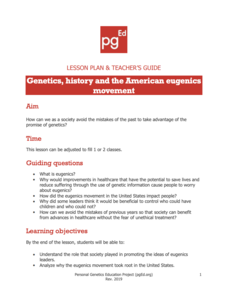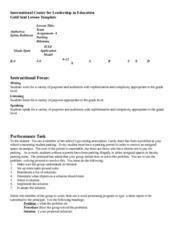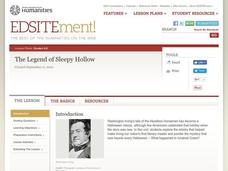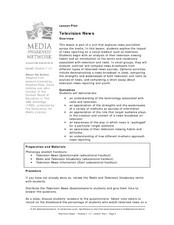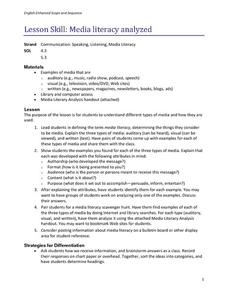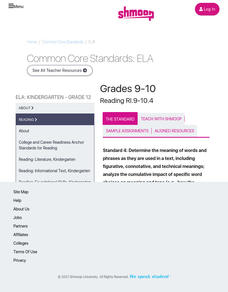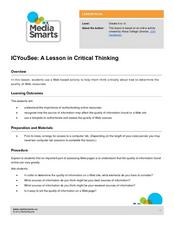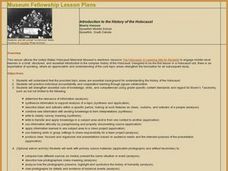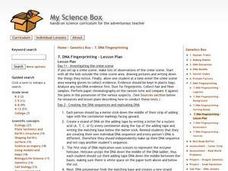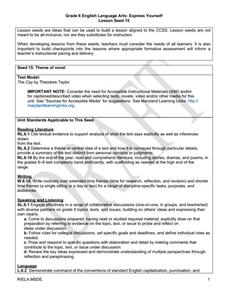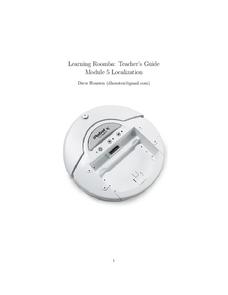National Center for Case Study Teaching in Science
A Tale of Two Houses
Does it cost more per year to heat Bill's home in North Dakota or to cool Bubba's home in Georgia? Using heat transfer concepts, mathematical equations, and critical thinking skills, young engineers work in groups to determine who is...
Common Sense Media
Should I Share? Poster
Whether or not you use mobile devices for learning in your classroom, this poster is a must for every school. Readers follow a simple flowchart to determine whether or not to share a photo of a friend online.
Personal Genetics Education Project
Genetics, history and the American Eugenics Movement
A poignant 20-slide show introduces high schoolers to the amazing accomplishments of genomics and raises the question of eugenics. This lesson is only for mature audiences, as it deals with rape and other sensitive topics, but it is...
Teach Engineering
Communicating Your Results
Groups analyze and interpret their data from previous research in order to develop individualized findings. The teams then use guidelines to help determine what aspects of their research to include on a poster. Class members then compare...
DiscoverE
Design a Shoe
Engage young scientists in a project where high fashion meets engineering! Using foam core and hot glue, partnered pupils design and create a functional, fashionable pair of shoes. Groups then put the footwear through its paces using a...
Briscoe Center for American History
Applying the SOAPS Method of Analyzing Historical Documents
Young historians use the SOAPS (Speaker, Occasion, Audience, Purpose, Subject) method of questioning to determine the historical value of primary source documents. The third in a series of five lessons that model for learners how...
Curated OER
Team Assignment - A Parking Dilemma
Class groups are challenged to solve the school’s parking problem. Each team must establish ground rules for their discussion, determine criteria that must be met, and brainstorm possible solutions. Next, they agree on one solution and...
Curated OER
Charles Darwin Meets John Paul II
If you teach AP English language and composition and are looking for a way to address the differences between written and spoken arguments, consider this lesson. Over the course of three days, class members research Charles Darwin or...
Curated OER
The Legend of Sleepy Hollow
Explore Washington Irving's "The Legend of Sleepy Hollow" in this literature analysis instructional activity. Middle schoolers read and summarize the plot of the story. They then adapt passages for a contemporary audience and analyze the...
Curated OER
Japanese Poetry: Tanka? You're Welcome!
Students explore tanka, a form of Japanese poetry. They read and analyze tankas to determine the structure and intent, and compose a traditional and a non-traditional tanka.
New York State Education Department
TASC Transition Curriculum: Workshop 10
How have educational standards evolved? Educators of adults examine expectations in the 10th workshop out of 15 to better determine how standards have grown. Participants respond to a variety of sample questions to determine how they...
Curated OER
Let's Put You in a Louisiana University
Considering a college search project? After picking a possible career choice, and determining if that career needs a technical college or university education, individuals examine a wide variety of sources and select three schools that...
Curated OER
Television News
Different media sources portray news in a variety of ways. In groups of three, learners look at different news sources, bringing in all the findings the next day. Three handouts help scholars compare sources, define specific terms used...
Curated OER
Media Literacy Analyzed
Fourth and fifth graders define the term media literacy, then come up with examples that they share with the class. The types of media studied are auditory, visual, and written. Learners get together in pairs and perform a media...
Shmoop
ELA.CCSS.ELA-Literacy.RI.9-10.4
Your pupils will be expected to determine the meaning of words and how those words affect the meaning of a text. Help them master this skill with the ideas listed here. First, look over the two activities that could be used for your...
Scholastic
Analyzing Media Messages
Telling young people to just say no can be difficult in a world that inundates them with messages to just say yes. A lesson on media messages encourages teenagers to analyze song lyrics and advertisements that mention drugs and/or...
Curated OER
ICYouSee: A Lesson in Critical Thinking
Stress the importance of authenticating online resources and understanding the sources of websites' information with this activity. Using a Web-based activity, the lesson prompts young learners to think critically about determining the...
Curated OER
Introduction to the History of the Holocaust
The Holocaust is unbelievable! Examine this piece of history with your class. Using the Internet, research groups determine the relevance of information presented, compare how different sites present the same information, synthesize...
Curated OER
DNA Fingerprinting
Students study the process of DNA Fingerprinting and how DNA Fingerprinting is used in solving crimes. They examine a crime scenario that involves collecting DNA Fingerprinting information from blood collected at the crime scene. They...
Curated OER
Identifying Irony
What are the three types of irony? After reviewing dramatic, situational, and verbal irony with your readers, present them with this two-page document. They read six excerpts to determine which type of irony is used in each. After...
Curated OER
Express Yourself Lesson Seed 15: Theme
Build understanding of theme with an activity designed for The Cay and the Common Core. Small groups or pairs use graphic organizers to determine themes, find and record related details from the text, and formulate theme statements. In...
Drexel University
Learning Roomba Module 5: Localization
Where is my robot? Pupils create programs that utilize the localization services that a Roomba uses to determine its surroundings.
Shodor Education Foundation
Overlapping Gaussians
Adjust the overlap to compare probabilities. Using sliders, learners adjust the shape of two Gaussian curves. The interactive calculates the area of the left tail for one curve and the right tail for the other. Pupils set the interactive...
Howard Hughes Medical Institute
What van Leeuwenhoek Saw
When van Leeuwenhoek saw cells and single-celled organisms for the first time, he knew these small things were a big deal! Share his discoveries with young learners through a narrated video, model-building activity, and scale study....




